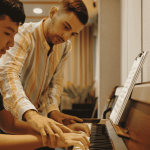Most people travel fast. They land, rush from one attraction to another, and check off a list of famous landmarks. Then they go home feeling tired, not transformed. That’s the problem with surface-level travel—it looks impressive on social media but feels empty in memory. Deeper travel is the opposite. It’s slower, quieter, and more personal. You focus less on “where” and more on “how.” How you connect, listen, and experience a place rather than consume it.
You don’t need months abroad or a big budget. What matters is your mindset. With the right approach, even a weekend trip can feel rich and meaningful.
Here are nine ways to travel more deeply, no matter how long you’re away.
Slow Down

The fastest way to ruin a trip is to cram it. Too many cities, many must-see spots, little time to breathe. You end up exhausted, not enlightened.
When you slow down, you start noticing life instead of chasing it. You catch the morning light on narrow streets, hear the rhythm of a café as locals chat over espresso. You see how people walk, how they greet each other, how they move through their day. That’s where the real magic hides.
Instead of ten short stays, pick two and linger. Give yourself space to settle in. Read a local newspaper. Take the same route each morning. Familiarity breeds comfort, and comfort opens doors to deeper observation.
Travel isn’t a race. The slower you move, the more the world reveals itself.
Prioritize Experiences
Souvenirs break. Photos fade. Experiences stay. That’s why it’s worth investing in moments, not merchandise.
A deeper traveler chooses meaning over material. You might skip a luxury restaurant but join a family-run workshop instead. You might forgo an expensive tour for an afternoon helping on a local farm. Each choice builds stories you’ll tell years later.
Ask yourself, “Will this make me feel alive?” That question filters out shallow plans. Adventure doesn’t have to mean danger—it can mean openness. Trying something new, something slightly uncomfortable, often brings the richest memories.
When you collect experiences, you collect perspective. You don’t just see a culture—you start to understand it.
Eat Local
If you want to understand a culture, start with its kitchen. Food is identity. It tells you what people value, how they survive, and how they celebrate.
Forget the familiar chains. Go where the menu isn’t translated. Order what the locals order. Sit back and observe. Watch how people eat. Notice how long they linger at the table. The details teach you more than any guidebook.
Local food is rarely just about taste. It’s about community and story. Maybe the dish came from a grandmother’s recipe or from centuries of migration. Every flavor carries a history if you’re willing to ask.
And if you’re not sure what to try? Ask someone. Locals love when visitors show curiosity about their cuisine. It’s one of the fastest ways to connect without saying much.
Book a Food Tour or a Cooking Class
There’s eating—and then there’s understanding what you eat. Cooking classes and food tours turn passive meals into living lessons.
A food tour walks you through hidden markets and family-owned stalls. You’ll learn what spices define a region, how ingredients change with the seasons, and why certain dishes matter. It’s knowledge served with taste.
Cooking classes go deeper. They teach rhythm, not just recipes. You’ll chop, stir, and laugh alongside someone who grew up cooking that dish. When you roll out dough or season stew, you step directly into another person’s world.
And later, when you cook it back home, you’ll remember that moment—not as a tourist, but as a participant in something human and shared.
Do Something “Normal”
Travelers often chase the spectacular. But the ordinary tells a truer story. Grocery stores, bus rides, or morning runs through a local park—these quiet moments reveal more than monuments ever can.
Go to a supermarket and see what people buy. Visit a barber shop. Sit on a bench and watch commuters hurry by. You’ll start to understand local rhythm—the pace, the tone, the everyday heartbeat of the place.
Routine connects you to reality. When you live like locals, even briefly, you stop being an observer. You become part of the environment. It’s grounding, humbling, and oddly peaceful.
Travel isn’t just about escape. It’s about recognition. Doing something “normal” reminds you that people everywhere share the same basic desires: comfort, connection, and belonging.
Attend a Festival
Festivals are windows into a culture’s soul. They gather everyone—young, old, rich, poor—around a shared story. Whether it’s a harvest celebration, religious ceremony, or music event, festivals pulse with life.
Plan your trip around one if you can. You’ll see how traditions come alive, not just how they’re displayed. The smells, sounds, and energy are overwhelming in the best way. It’s where history meets joy.
At a local festival, you’re not a spectator. You’re part of the movement. Dance if they dance. Sing if they sing. You’ll learn more about a culture’s values in one night of celebration than in a week of sightseeing.
Festivals also build friendships fast. Strangers become companions. You laugh, eat, and share stories without caring about language. That’s cultural connection in its purest form.
Talk to Locals
You can’t travel deeply without people. Landscapes are beautiful, but it’s the human stories that make them meaningful.
Start conversations. Ask simple things: where to eat, what they do for fun, what they think about their city. Most people love to share their world when asked respectfully.
Even short chats can open new paths. You might end up at a neighborhood barbecue or an art show you never knew existed. Locals hold keys to experiences no brochure can offer.
Don’t worry about perfect grammar. Effort matters more than fluency. A smile bridges most gaps. And sometimes, silence paired with kindness says enough.
Travel becomes transformation when you stop talking about places and start talking with people.
Take Time to Reflect
Every day of travel gives you material for reflection. But reflection doesn’t happen automatically—you have to make space for it.
Spend a few quiet minutes each night writing or thinking. What surprised you? Did you feel uncomfortable? What will you remember most? Those small notes sharpen your perspective and help you carry meaning home.
Reflection also prevents burnout. When you pause, you appreciate. Instead of chasing the next attraction, you absorb what’s already in front of you.
Later, when you reread those notes, you’ll notice growth. Travel doesn’t just change your view of the world; it changes your view of yourself.
One Moment of Realization
Every traveler has that quiet moment when the noise fades and understanding begins. It could be sitting at a train station, watching families reunite. Or standing by a river while an old man fishes, humming softly.
You realize then that travel isn’t about distance. It’s about awareness. The more open you are, the deeper you see.
For some, that moment happens early. For others, it sneaks up after dozens of trips. But when it does, you stop chasing places and start appreciating presence.
That’s when you truly travel.
Conclusion
Deeper travel isn’t a technique—it’s an attitude. It’s the choice to engage rather than observe, to listen rather than rush. Whether your trip lasts three days or three months, depth comes from how you spend your time, not how much of it you have.
Slow down. Savor each meal. Join conversations. Watch how life unfolds around you. Every culture, every street, every shared smile adds another layer to your understanding of the world.
And remember: traveling deeply doesn’t always mean going far. Sometimes the richest discoveries happen just beyond your comfort zone.
So next time you pack, don’t just prepare your suitcase. Prepare your attention. The world doesn’t need more visitors—it needs more participants.
Also Read: Essential Tech Gear Packing List for Digital Nomads
FAQs
1. What does deeper travel mean?
It means moving beyond sightseeing. You connect with people, culture, and rhythm rather than chasing checklists.
Yes. Even a weekend can be meaningful if you slow down and focus on connection instead of coverage.
Food tells cultural stories. Local dishes reveal traditions, values, and how people live day to day.
Start small—ask questions, join tours, attend events. Most locals appreciate genuine curiosity.










